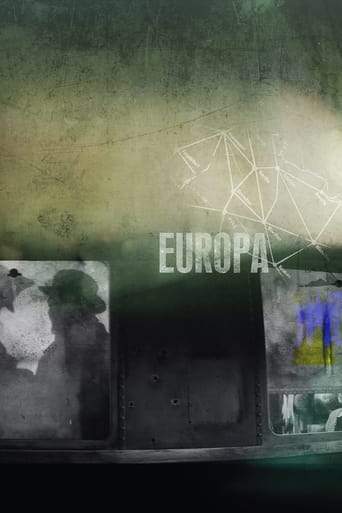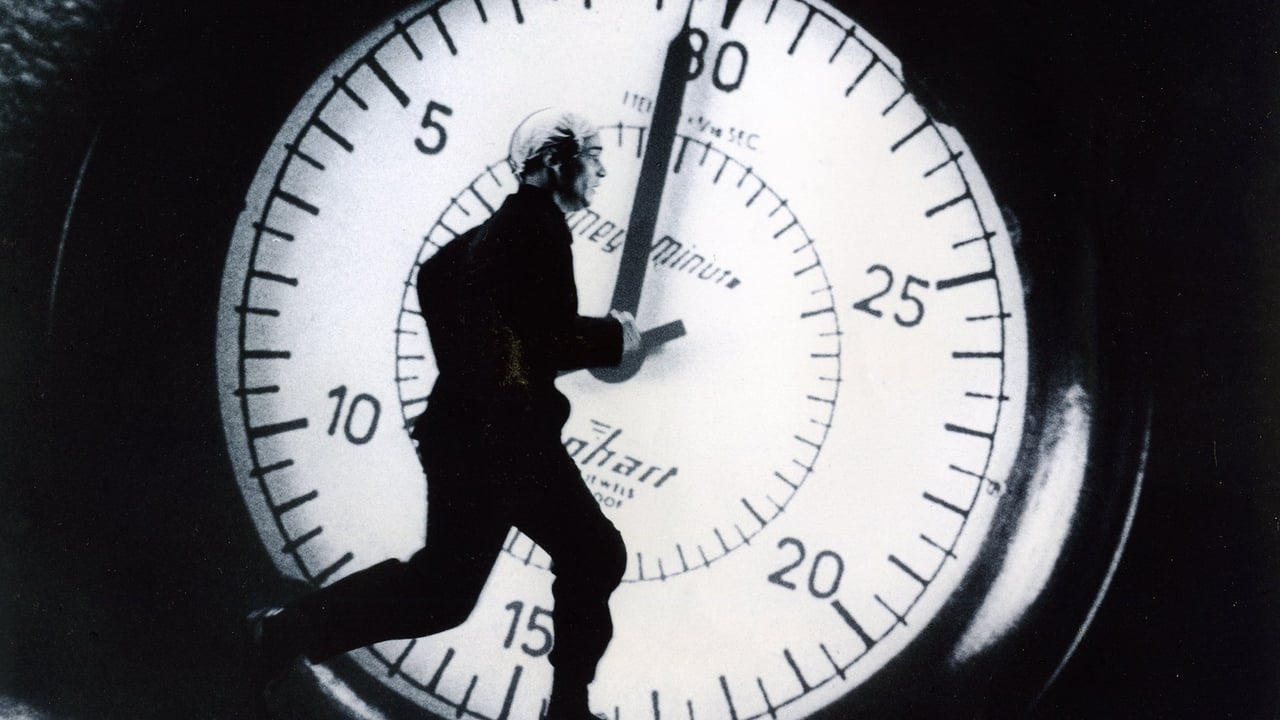gavin6942
Just after World War II, an American takes a railway job in Germany, but finds his position politically sensitive with various people trying to use him.I waited too long to write this review, so I cannot do it justice until a second viewing. But it is a perfect storm of European genius. Max von Sydow narrating, Udo Kier appearing (as he does in many of von Trier's works). And the amalgamation of Europe on a train...What sells this film is the visuals, hands down. Von Trier's mix of black and white and classic color give this quite the dreamlike feel. That, mixed with the Kafkaesque plot, and you are sucked into an imaginary world of real life... perhaps not unlike David Cronenberg's "Naked Lunch".
jzappa
Released as Zentropa in North America to avoid confusion with Agniezska Holland's own Holocaust film Europa Europa, this third theatrical feature by a filmmaker who never ceases to surprise, inspire or downright shock is a bizarre, nostalgic, elaborate film about a naive American in Germany shortly following the end of WWII. The American, named Leo, doesn't fully get what he's doing there. He has come to take part in fixing up the country since, in his mind, it's about time Germany was shown some charity. No matter how that sounds, he is not a Nazi sympathizer or so much as especially pro-German, merely mixed up. His uncle, who works on the railroad, gets Leo a job as a helmsman on a sleeping car, and he is increasingly enmeshed in a vortex of 1945 Germany's horrors and enigmas.This progression starts when Leo, played rather memorably by the calm yet restless actor Jean-Marc Barr, meets a sultry heiress on the train played by Barbara Sukowa, an actress with gentility on the surface but internal vigor. She seduces him and then takes him home to meet her family, which owns the company which manufactures the trains. These were the precise trains that took Jews to their deaths during the war, but now they run a drab day-to-day timetable, and the woman's Uncle Kessler postures as another one of those good Germans who were just doing their jobs. There is also Udo Kier, the tremendous actor who blew me away in Von Trier's shocking second film Epidemic, though here he is mere scenery.Another guest at the house is Eddie Constantine, an actor with a quiet strength, playing a somber American intelligence man. He can confirm that Uncle Kessler was a war criminal, though it is all completely baffling to Leo. Americans have been characterized as gullible rubes out of their element for decades, but little have they been more blithely unconcerned than Leo, who goes back to his job on what gradually looks like his own customized death train.The story is told in a purposely uncoordinated manner by the film's Danish director, Lars Von Trier, whose anchor is in the film's breathtaking editing and cinematography. He shoots in black and white and color, he uses double-exposures, optical effects and trick photography, having actors interact with rear-projected footage, he places his characters inside a richly shaded visceral world so that they sometimes feel like insects, caught between glass for our more precise survey.This Grand Jury Prize-winning surrealist work is allegorical, but maybe in a distinct tone for every viewer. I interpret it as a film about the last legs of Nazism, symbolized by the train, and the ethical accountability of Americans and others who appeared too late to salvage the martyrs of these trains and the camps where they distributed their condemned shiploads. During the time frame of the movie, and the Nazi state, and such significance to the train, are dead, but like decapitated chickens they persist in jolting through their reflexes.The characters, music, dialogue, and plot are deliberately hammy and almost satirically procured from film noir conventions. The most entrancing points in the movie are the entirely cinematographic ones. Two trains halting back and forth, Barr on one and Sukowa on another. An underwater shot of proliferating blood. An uncommonly expressive sequence on what it must be like to drown. And most metaphysically affecting of all, an anesthetic shot of train tracks, as Max von Sydow's voice allures us to hark back to Europe with him, and abandon our personal restraint.
Claudio Carvalho
On October of 1945, the American German descendant Leopold Kessler (Jean-Marc Barr) arrives in a post-war Frankfurt and his bitter Uncle Kessler (Ernst-Hugo Järegård) gets a job for him in the Zentropa train line as a sleeping car conductor. While traveling in the train learning his profession, he sees the destructed occupied Germany and meets Katharina Hartmann (Barbara Sukowa), the daughter of the former powerful entrepreneur of transport business and owner of Zentropa, Max Hartmann (Jørgen Reenberg). Leopold stays neutral between the allied forces and the Germans, and becomes aware that there is a terrorist group called "Werewolves" killing the sympathizers of the allied and conducting subversive actions against the allied forces. He falls in love for Katharina, and sooner she discloses that she was a "Werewolf". When Max commits suicide, Leopold is also pressed by the "Werewolves" and need to take a position and a decision."Europa" is an impressive and anguishing Kafkanian story of the great Danish director Lars von Trier. Using an expressionist style that recalls Fritz Lang and alternating a magnificent black & white cinematography with some colored details, this movie discloses a difficult period of Germany and some of the problems this great nation had to face after being defeated in the war. Very impressive the action of the occupation forces destroying resources that could permit a faster reconstruction of a destroyed country, and the corruption with the Jew that should identify Max. Jean-Marc Barr has an stunning performance in the role of man that wants to stay neutral but is manipulated everywhere by everybody. The hypnotic narration of Max Von Sydow is another touch of class in this awarded film. My vote is nine.Title (Brazil): "Europa"
ccthemovieman-1
Wow, here's a strange film, at least visually. This Danish-German movie is a combination of black-and-white and color. Most of the time, the color is just used for one or two items in a scene, such as someone's face, or an object on screen.The narration is from a person who talks like a hypnotist (and sounds stupid, most of the time.) It negates the fascinating visuals. The story is just so weak and confusing that after 45 minutes, it's tough to stay interested. It's a depressing post WWII-Germany story. Note: this is the third film in a trilogy by director-writer Lars Von Trier. In fairness, I should see this on DVD, and the other two films. The visuals might be so good on that format that I could tolerate the story.


 AD
AD



